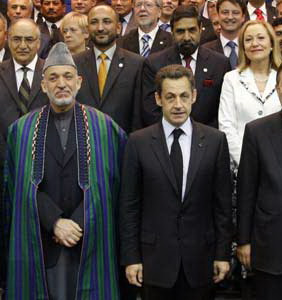Tehran’s absence in Paris meeting
A commentary by Morteza Kazemian

Last Sunday, a meeting on Afghanistan was held in Paris. All Afghanistan neighbors –except Iran- were present in the meeting to discuss security and stability in the country; and putting strict regulations over drug struggling and terrorist groups’ actions. The Afghanistan crisis in the region, economic problems of the country, and the participation of Afghans in security and reconstruction of their country were other main points of discussion in Paris.
Tehran’s absence in this meeting was truly felt. The French president Nicola Sarkozy had recently made harsh remarks on Iran and the absence of Iran in Paris meeting could be predicted. The Iranian foreign minister Manoucher Mottaki did not attend the meeting. But according to the French foreign ministry, no Iranian representative-even the Iranian ambassador in France- attended the Paris meeting; and it was a meaningful gesture.
Recently, Nicola Sarkozy had said that the Iranian nation was "misfortune" to be presented by some of its leaders; and that Ahmadinejad is not the representative of the Iranian nation. According to Sarkozy, it was "impossible" for him to "shake hands" with his Iranian counterpart who did not recognize Israel and wants it to be wiped off the map.
Reacting to Sarkozy’s remarks, the Iranian foreign ministry declared that Iran would not attend the Paris conference on Afghanistan reconstruction. Ahmadinejad also said in a speech that Iran had no intention of recognizing Israel: "Whoever wants to negotiate with Iran should know that Iran will never recognize the Zionist regime." Ahmadinejad also insisted that "Those who want to negotiate with Iran should know that Iran is calling for obliteration of crime, aggression, occupation and the genesis of Zionist thinking from the world."
Sarkozy’s remarks on Iran were not surprising. From the time that he was the interior minister of France, he had strict positions on Iran; and after being elected as the French president, his positions on Iran got close to the US administration. This is obviously different from the traditional positions of France.
The French foreign minister Bernard Couchner is also pursuing a hard line on Iran; so it is the approach that the French diplomacy has taken. Commentators believe that Sarkozy’s approach is different from the traditions of the fifth republic of France. The fifth republic advocated close relations with Muslim countries of the Middle East and having a balanced position over the Arabs and Israel. So the Paris-Tehran relations are not really having a good time now.
Unfortunately, the recent rhetorical challenge between Iran and France led to losing an opportunity to attend the conference on reconstruction of Afghanistan. Iran has historical, cultural, political, and economic; security and social common points with Afghanistan and this opportunity could be very useful.
In Paris meeting, foreign ministers of Pakistan, Uzbekistan, Turkmenistan, Tajikistan, China, India, the permanent members of security council, Germany, Italy, the US special representative in Afghanistan, and the EU senior officials were present; and all the states having troops in Afghanistan were also there.
The Paris meeting was important because right now, the US, UK and even France are trying to find a way to bring the Taliban to the negotiation table and stop their influence. But Iran did not attend the meeting; and it was meaningful. Before finalizing his trip to Paris, Manoucher Mottaki had said that the Paris meeting could be a good opportunity to change wrong policies of the US. But Iran’s absence in the meeting would mean that Iran needs to put more energy on the issue to achieve its interests. Undoubtedly, bringing security and stability to Afghanistan would be hard to achieve without Iran’s participation. But at the same time, Iran’s absence in such meetings would mean deprivation from playing an influential role in Afghanistan. It is important because Iran has endured effects from Afghanistan crisis (like the presence of Afghan immigrants, the drugs transit, Taliban activities and the insecurity and instability of the region).
According to article 152 of the Iranian constitution, "the Iranian foreign policy is based on refusing the hegemony of other countries, maintaining independence, defending the territorial integration, defending the rights of all Muslims, giving no commitments to hegemonic powers, and having mutual and peaceful relations with non-hostile countries."
Now one could ask whether these lines are observed in the diplomacy of Iran or not? The absence of all Iranian officials in Paris meeting is one of the noticeable points in this regard. The discussions on Afghanistan are concentrated on the rights of Afghans; and there is no hostility or hegemony involved; and so there is no point in Iran’s absence.
There are many similar questions which should be asked from Ahmadinejad’s administration. Unfortunately, some Iranian policy makers prioritize government interests over national interests; and this approach has led to losing many opportunities for Iran.

